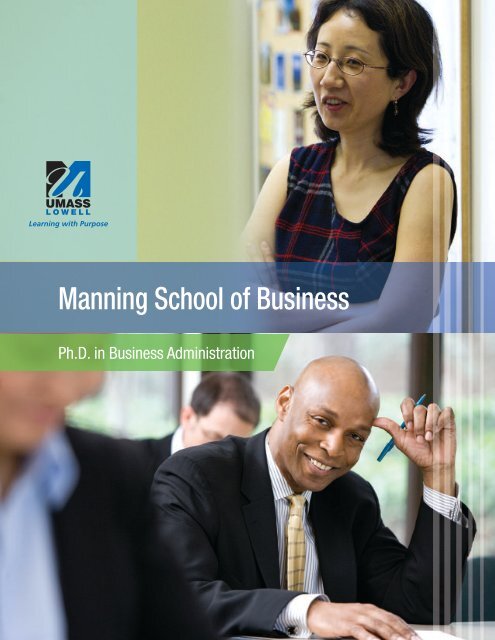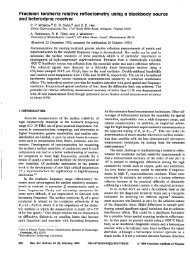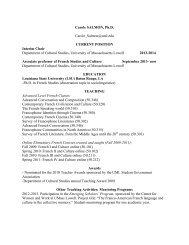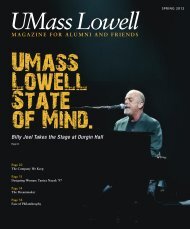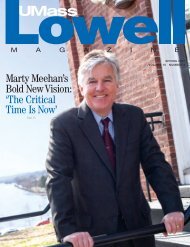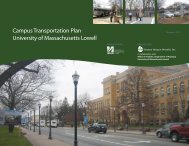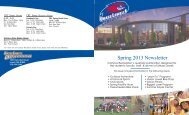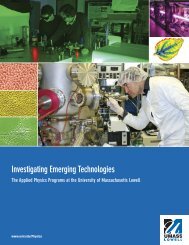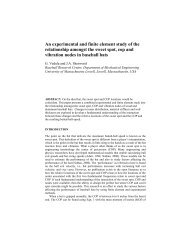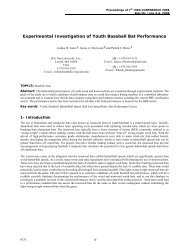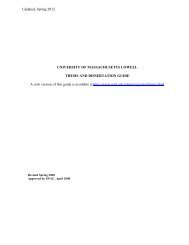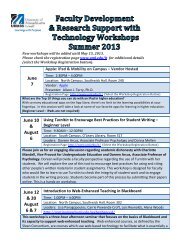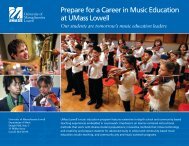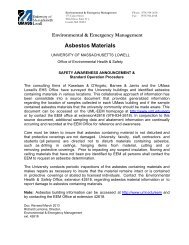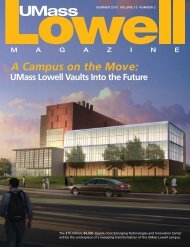Manning School of Business - University of Massachusetts Lowell
Manning School of Business - University of Massachusetts Lowell
Manning School of Business - University of Massachusetts Lowell
Create successful ePaper yourself
Turn your PDF publications into a flip-book with our unique Google optimized e-Paper software.
<strong>Manning</strong> <strong>School</strong> <strong>of</strong> <strong>Business</strong><br />
Ph.D. in <strong>Business</strong> Administration
W E L C O M E<br />
A Note From Scott Latham,<br />
Associate Dean <strong>of</strong> the Ph.D. Program<br />
Hello –<br />
Thank you for considering the Ph.D. Program in the <strong>Manning</strong> <strong>School</strong><br />
<strong>of</strong> <strong>Business</strong>. In Fall 2013, we welcome our first cohort <strong>of</strong> Ph.D.<br />
students into the program. While the program is new, our research<br />
tradition is well established:<br />
• US News & World Report ranks UMass <strong>Lowell</strong> among the<br />
top 200 research universities nationally.<br />
• Times <strong>of</strong> London ranks UMass system 56th <strong>of</strong> the top<br />
200 universities in the world and 19th for academic<br />
and research reputation.<br />
• In 2011, the Neeley <strong>School</strong> <strong>of</strong> <strong>Business</strong> at TCU<br />
completed a study <strong>of</strong> the most productive research<br />
faculty in entrepreneurship. The <strong>Manning</strong> <strong>School</strong> <strong>of</strong><br />
<strong>Business</strong> was ranked in the top 30 worldwide, along with<br />
Arizona State, Penn State and the London <strong>School</strong> <strong>of</strong> Economics.<br />
• The <strong>Manning</strong> <strong>School</strong> <strong>of</strong> <strong>Business</strong> was also identified by the Princeton Review as one <strong>of</strong><br />
the Best 294 <strong>Business</strong> <strong>School</strong>s.<br />
We’re building a world-class, innovative program from the ground up, and we’d love you to<br />
be a part <strong>of</strong> it. We’re looking for individuals with an intellectual curiosity about the nature and<br />
manner in which organizations work. Perhaps you’re interested in how organizations finance<br />
new projects. Maybe you wonder how a business decides to adopt a new accounting system.<br />
Or, you may wish to explore whether gender affects leadership style and effectiveness.<br />
Regardless <strong>of</strong> the discipline, the Ph.D. in <strong>Business</strong> Administration examines why organizations<br />
work in the manner they do.<br />
As a Ph.D. student, regardless <strong>of</strong> where you decide to attend school, you will quickly learn that<br />
it is the people—faculty, staff and administrators—that shape your progression as a doctoral<br />
student. Earning a doctorate is an exciting journey, but it also comes with a fair amount <strong>of</strong><br />
stress and anxiety. UMass <strong>Lowell</strong> is comprised <strong>of</strong> people that are heavily invested and care<br />
about your development.<br />
If you have any questions, please contact me at 978-934–2832 or scott_latham@uml.edu<br />
Sincerely,<br />
Scott Latham ’98, Ph.D.<br />
Associate Dean, Ph.D. Program
WHAT MAKES THE MANNING SCHOOL OF<br />
BUSINESS’ PH.D. DIFFERENT?<br />
As you begin to assess, compare and evaluate different Ph.D. programs, consider what<br />
separates the <strong>Manning</strong> <strong>School</strong> <strong>of</strong> <strong>Business</strong> from other Ph.D. institutions.<br />
www.uml.edu/msb<br />
• Established research excellence. We have world-class faculty who are conducting<br />
cutting-edge research. Our faculty have recently won multimillion-dollar grants, been<br />
awarded best-paper honors by the most renowned academic publishers and been cited<br />
by other institutions for excellence. In 2011, the Neeley <strong>School</strong> <strong>of</strong> <strong>Business</strong> at TCU<br />
completed a study <strong>of</strong> the most productive research faculty in entrepreneurship; the<br />
<strong>Manning</strong> <strong>School</strong> <strong>of</strong> <strong>Business</strong> was ranked in the top 30 worldwide.<br />
• Emphasis on balance. Most Ph.D. programs are heavily focused on research;<br />
it’s not surprising to see a graduating doctoral student to have never taught on her<br />
or his own. We believe that research is important, but that teaching is equally so.<br />
Research should reinforce a scholar’s teaching, and teaching should provide<br />
an opportunity to have a conversation with practitioners about current issues.<br />
• Diversity <strong>of</strong> thought in the classroom. In the early part <strong>of</strong> the program,<br />
Ph.D. students will be in classes with other Ph.D. students from a diverse<br />
spectrum, including global studies, criminal justice and education. We believe<br />
that such an approach creates a cauldron for learning, as individuals’<br />
perspectives and biases are challenged by their peers.<br />
• Flexible program <strong>of</strong>fering. The <strong>Manning</strong> <strong>School</strong> <strong>of</strong> <strong>Business</strong> is different<br />
in its approach to earning a Ph.D. We <strong>of</strong>fer both full- and part-time<br />
degree options, making us one <strong>of</strong> only a few institutions with such<br />
flexibility. The expectation is that full-time students will finish in four<br />
years, while part-time students will finish in seven years. Regardless<br />
<strong>of</strong> the path, the hope is that Ph.D. students will secure a position in a<br />
peer or aspirant institution.<br />
• Established partnerships with industry. <strong>Lowell</strong> sits at the intersection <strong>of</strong> Route 3,<br />
Route 128 and Route 495—in the heart <strong>of</strong> <strong>Massachusetts</strong>’ innovation cluster. <strong>Lowell</strong><br />
gave birth to the American Industrial Revolution and continues to play a central role in<br />
innovative industries, such as information technology, biotechnology, plastics and<br />
medical devices. Doctoral students can expect to leverage our industry relationships<br />
in their research, teaching and consulting.<br />
• Innovation in action. UMass <strong>Lowell</strong> is the home <strong>of</strong> several innovative and entrepreneurial<br />
centers. For example, M2D2, the state’s medical device incubator, resides at UMass<br />
<strong>Lowell</strong>. This joint partnership with the UMass Medical <strong>School</strong> is indicative <strong>of</strong> the emphasis<br />
on innovation at UMass <strong>Lowell</strong>. This emphasis makes for an invaluable breeding ground<br />
for research opportunities.<br />
• Dedicated resources. At a time when many colleges and universities are struggling<br />
with shifts in enrollment, UMass <strong>Lowell</strong> is growing. In academia, enrollments are linked<br />
to resources. Accordingly, UMass <strong>Lowell</strong> has made a strong commitment to our Ph.D.<br />
programs amd we have the necessary resources such as databases and travel support<br />
to ensure your success.
WE ARE LOOKING FOR TOMORROW’S<br />
THOUGHT LEADERS<br />
We believe that in building our Ph.D. program from the ground up, we are building<br />
something special. Thus, we are looking for Ph.D. applicants with the following<br />
qualities:<br />
• Intellectual curiosity. We are looking for individuals with an intellectual<br />
curiosity about the nature and manner in which organizations work. This can<br />
take several forms depending on the discipline. It might be an inquiry into<br />
the manner in which organizations finance new projects or the decision in<br />
adopting a new accounting system or whether gender affects leadership style<br />
and effectiveness.<br />
• Experienced perspective. We are looking for experienced working pr<strong>of</strong>essionals<br />
that wish to make a shift to education. Pr<strong>of</strong>essional experience can be incredibly<br />
helpful in setting a research agenda. It also makes the instructor more credible in<br />
the classroom, when they can rely on personal experience.<br />
• Strong work ethic. Regardless <strong>of</strong> the institution, earning a Ph.D. is a significant<br />
commitment. In a given week, full-time students can expect to dedicate between<br />
50 and 60 hours to classwork, research and class preparation. In effect,<br />
pursuing a Ph.D. is a full-time job and should be considered as such.<br />
• Tenacious commitment. Research is a complex endeavor that <strong>of</strong>ten<br />
entails a fair amount <strong>of</strong> failure. Successful researchers understand that if<br />
at first you don’t succeed, then try, try again. Research is also subject to<br />
a fair amount <strong>of</strong> criticism by the academic community; the ability to<br />
accept criticism and soldier on is important.<br />
• Dedication to team. Earning a Ph.D. is not a solo endeavor. Ph.D.<br />
students are part <strong>of</strong> a larger team comprised <strong>of</strong> faculty, staff and<br />
classmates—who together make up your “Ph.D. Team.” Successful<br />
Ph.D. students understand how to leverage the expertise <strong>of</strong> the<br />
“Ph.D. Team” and are also willing to help their fellow students.<br />
• Willingness to challenge status quo. Good scholars take a<br />
fresh look at existing dynamics within organizations. The <strong>Manning</strong><br />
<strong>School</strong> <strong>of</strong> <strong>Business</strong> is looking for Ph.D. prospects who are always willing to<br />
engage in a debate—more <strong>of</strong>ten than not, novel and innovative research is the<br />
product <strong>of</strong> a respectful debate.<br />
• Solid writing skills. Successful scholars have an uncanny ability to put their<br />
voice to paper. Since publishing is the name <strong>of</strong> the game in academia, strong<br />
writing skills are a must.
OUR FACULTY ARE UNPARRALLELED SCHOLARS<br />
The most important factor in a Ph.D. student’s success is the ability to build and maintain positive relationships with the faculty. The <strong>Manning</strong> <strong>School</strong><br />
<strong>of</strong> <strong>Business</strong>’ faculty are exceptional researchers who are eager to work with doctoral students. Below, a selection <strong>of</strong> the MSB faculty describe their<br />
current research:<br />
Yi Yang, Ph.D., Management and Entrepreneurship:<br />
“My primary research focuses on technology-oriented corporate entrepreneurship<br />
activities such as corporate venturing, R&D alliances and new<br />
technology/product development. One <strong>of</strong> my recent studies examined the<br />
relationships between entrepreneurial companies and large firms in technology<br />
ecosystems. Such relationships have been metaphorized as ‘swimming<br />
with sharks.’ My findings reveal the impacts <strong>of</strong> technology relatedness and<br />
multi-homing strategies, and give entrepreneurial companies suggestions<br />
on how to effectively manage the relationship with the ‘sharks.’”<br />
Steven Freund, Ph.D., Finance:<br />
"My latest research examines PIPEs (Private Investment in Public Equity),<br />
a last-resort source <strong>of</strong> funds. In general, PIPE issuance is accompanied<br />
by significant positive returns to common shareholders, indicating the<br />
welcoming news <strong>of</strong> additional financing. On the other hand, the issuance<br />
<strong>of</strong> PIPEs with extraordinary protection for the private investors, a reward<br />
for investing in the firm but harmful to existing shareholders, results in<br />
a downward revision <strong>of</strong> the stock price. The lesson for managers:<br />
shareholders recognize the information content <strong>of</strong> PIPEs.”<br />
Hieu Phan, Ph.D., Finance:<br />
“I am currently examining the effect <strong>of</strong> executive compensation in the form<br />
<strong>of</strong> debt, such as pension and deferred compensation, on mergers and<br />
acquisitions (M&As) and their outcomes. Interestingly, I find that debt-based<br />
compensation mitigates managers’ incentives to take risks in M&As, which<br />
benefits the acquirer creditors in the short term and the acquiring firms and<br />
their shareholders in the long term. My research has significant implications<br />
for improving executive compensation efficiency as well as M&A outcomes.”<br />
Luvai F. Motiwalla, Ph.D., Management Information Systems:<br />
“My current research focuses on protecting individual privacy in this digital<br />
world. Specifically, I’m concentrating in the health-care field and what I find<br />
is that current privacy laws (like HIPAA) or security technologies used are<br />
inadequate in protecting patients’ health data. Using funds from a National<br />
Institutes <strong>of</strong> Health grant, I am working on developing new protection<br />
technology as well as processes to help health-care providers do a better<br />
job in protecting patient data, while sharing health data for medical or<br />
health-policy research.”<br />
Cory Cromer, Ph.D., Marketing Strategy/Innovation/<br />
New Product Development:<br />
“I’m currently examining the effect a company’s ecosystem orientation has<br />
on their new product development success. Furthermore, a company’s<br />
ecosystem may become the dominant marketing strategy for increasing<br />
consumer adoption. As a product manager from HTC said: ‘Where you are in<br />
your ecosystem is basically the difference between selling on the market’s<br />
margins, versus setting margins, and those are two completely different<br />
worlds.’ If I was going to start a new company today, I’d make sure that<br />
every person hired lived for that culture, and if they slipped through the<br />
cracks, do what companies like Google and Zappos (do), give them a<br />
bonus to leave the company early on.”<br />
Stefanie Tate, Ph.D., Audit Quality and Non-Pr<strong>of</strong>it Organizations:<br />
“I am currently researching how heightened risks to manipulate financial<br />
statements affect audit fees. We find that while increased risks are associated<br />
with increased fees, not all audit firms price the risk the same way. In fact,<br />
the largest audit firms in the world (the Big 4) do not increase fees to the<br />
same extent that small audit firms do. Audit fees charged by the Big 4 are<br />
driven much more strongly by the size <strong>of</strong> the organization being audited<br />
than by any other organization-specific factor. Audit managers and partners<br />
at the Big 4 may find the results interesting as they consider their current<br />
fee setting policies, and they may begin to reassess how heightened risk<br />
should be incorporated into fees.”<br />
Xiaobai Li, Ph.D., Management Information Systems:<br />
“We are in the information economy. As a society, we are producing and<br />
capturing more data each day than ever before. Data mining technologies<br />
enable organizations to extract intelligence from this massive data to better<br />
serve their customers and thus gain competitive advantages. While this<br />
is encouraging, there are increasing concerns about privacy invasion.<br />
My research focuses on analytic approaches and technologies that allow<br />
the organizations to benefit from data mining while preserving individual<br />
privacy.”<br />
Khondkar E. Karim, DBA, CPAL:<br />
“In recognition <strong>of</strong> the high cost <strong>of</strong> regulatory compliance, I am looking at<br />
the reporting quality principally by using earnings management and accrual<br />
quality measures. We detect a significant deterioration in reporting quality.<br />
This evidence is worthy <strong>of</strong> interest to market participants and can inform<br />
the current debate on providing exemption to even larger firms. Additionally,<br />
managers can probably imagine a scenario in the future in which reporting<br />
gains outweigh the compliance costs, making compliance beneficial overall.”
PROGRAM OVERVIEW<br />
As you consider applying to the <strong>Manning</strong> <strong>School</strong> Ph.D. program, please review the<br />
following critical information:<br />
Program Timing<br />
The Ph.D. program can be completed on a full- or part-time basis. The expectation<br />
is that full-time students will finish the program within four years, while part-time<br />
students will require no more than seven years. The program will be delivered<br />
year-round in three 12-week sessions. Fall and spring sessions will begin with the<br />
traditional semesters and the summer session will begin one to two weeks after<br />
the conclusion <strong>of</strong> the spring session.<br />
Student Support<br />
Full-time students will receive a tuition waiver, as well as<br />
full financial support for four years. In return, full-time<br />
Ph.D. students will work as research assistants and<br />
teaching assistants. In Year One and Year Two <strong>of</strong> the<br />
program, students receive research assistantships, while<br />
in Year Three and Year Four students receive teaching<br />
assistantships. Part-time students do not receive tuition<br />
waivers or assistantships, but may be eligible for research<br />
and teaching assistantships on a case-by-case basis.<br />
Admission Requirements<br />
Admission into the program is highly competitive. Each year, rolling<br />
enrollment will open on Nov. 15. The following criteria must be met<br />
prior to consideration. Waivers are granted only by the written<br />
approval <strong>of</strong> the associate dean <strong>of</strong> the Ph.D. program.<br />
• Graduate <strong>of</strong> an accredited U.S. college or university or an approved<br />
foreign equivalent institution.<br />
• Earned grade point averages <strong>of</strong> 3.0 or better in all prior undergraduate and<br />
graduate studies.<br />
• Minimum <strong>of</strong> four years full-time relevant work experience.<br />
• Satisfactory GMAT taken within the last ten years.<br />
• Three letters <strong>of</strong> recommendation.<br />
• International students are expected to at least meet the minimum<br />
UMass <strong>Lowell</strong> TOEFL requirements.<br />
The faculty admissions committee will review all <strong>of</strong> the above admissions materials<br />
in a portfolio approach. In addition, students will be expected to have successfully<br />
demonstrated graduate-level knowledge in seven functional areas: accounting,<br />
finance, marketing, organizational behavior, MIS, operations management and<br />
strategic management. Additionally, they will demonstrate undergraduate<br />
competency in calculus, statistics and micro/macro economics.
PH.D. SPECIALIZATIONS<br />
The program has six distinct specializations: finance, accounting, management<br />
information systems and technology management will be <strong>of</strong>fered beginning in fall<br />
2013; leadership and international business will be <strong>of</strong>fered beginning in fall 2014.<br />
Finance Specialization<br />
The finance specialization will develop scholars with a deep understanding <strong>of</strong><br />
financial markets, investment theories, financial innovations and strategies and the<br />
current challenges facing financial specialists. This program will be grounded with<br />
course content, research methodologies and projects developed collaboratively by<br />
faculty and financial industry partners to meet the research challenges facing the<br />
financial community.<br />
Accounting Specialization<br />
The accounting specialization will concentrate on relevant bodies <strong>of</strong> knowledge,<br />
such as financial accounting, managerial accounting, auditing and taxation.<br />
The curriculum is designed to develop a high level <strong>of</strong> student technical and research<br />
competence in a specifically defined program area <strong>of</strong> business. Strong attention will<br />
be paid to linking accounting research with accounting practice, specifically guidance<br />
relative to best and evolving practices in the accounting field.<br />
Management Information Systems Specialization<br />
The MIS specialization will focus on innovative and competitive IT/IS management<br />
theories, strategies and practices and their impact on organizations and society.<br />
Consistent with the other specializations, the MIS specialization will concentrate<br />
on current IT/IS challenges facing the industry today. IT/IS industry input and<br />
collaboration will be continually sought to develop appropriate projects and maintain<br />
currency in this program.<br />
Technology Management Specialization<br />
The technology management specialization will develop scholars who are<br />
thought leaders on how innovations, specifically in high-tech industries, are<br />
managed across the technology life cycle. Ph.D. students will gain a thorough<br />
understanding <strong>of</strong> the existing research on the macro level, as well as the firm<br />
and managerial level.<br />
International <strong>Business</strong> Specialization<br />
The international business specialization will prepare scholars who have<br />
interests in the theory, research and practice <strong>of</strong> management with a<br />
cross-border or cross-cultural dimension. Given the trend <strong>of</strong> globalization<br />
and the importance <strong>of</strong> emerging economies, international business has<br />
become one <strong>of</strong> the fastest-growing areas <strong>of</strong> interest by both academic<br />
researchers and practitioners.<br />
Leadership Specialization<br />
The leadership specialization will craft scholars who have a thorough<br />
understanding <strong>of</strong> the complex facets <strong>of</strong> organizational leadership.<br />
Leadership is one <strong>of</strong> the most studied organizational dynamics, and still<br />
one <strong>of</strong> the least understood. Leadership Ph.D. students will be expected to<br />
develop an understanding <strong>of</strong> the theoretical lineage <strong>of</strong> leadership, from great<br />
man theory and trait theory up to more recent dynamic leadership theories.
PROGRAM CURRICULUM AND FLOW<br />
Students must complete 64 credits: 46 course credits and 18 dissertation credits.<br />
Progress through the program can be broken down into four distinct stages:<br />
• Completion <strong>of</strong> core courses and core exam.<br />
• Completion <strong>of</strong> specialization/elective courses and comprehensive exam.<br />
• Completion <strong>of</strong> dissertation proposal.<br />
• Completion <strong>of</strong> dissertation defense.<br />
Again, pace is determined by whether the student is a<br />
full- or part-time student.<br />
Core Courses and Core Exam<br />
Upon admittance into the program, students will focus on core<br />
courses. The objective <strong>of</strong> these courses is to provide Ph.D.<br />
students with the requisite tools to conduct rigorous research.<br />
Certain core courses are required <strong>of</strong> specific specializations; these<br />
are indicated in the table at right. Nineteen credits are completed<br />
across the core—six core courses (each 3 credits), as well as the<br />
Managerial Research Seminar (1 credit).<br />
After completing the majority <strong>of</strong> the core courses, typically at the<br />
end <strong>of</strong> the first year for full-time students, students will undertake a<br />
core exam. This exam is designed to ensure that the student can<br />
apply the concepts from the first year <strong>of</strong> coursework. Exams are<br />
graded by a team <strong>of</strong> faculty; adequate performance is required for<br />
advancement in the program.<br />
Specialization/Elective Courses and Comprehensive Exam<br />
After completing the majority <strong>of</strong> core courses, students will<br />
then transition into specialization and elective courses. Each<br />
specialization requires five three-credit courses. These courses are<br />
selected with the guidance <strong>of</strong> a faculty adviser. Ph.D. students will<br />
also complete four elective courses. These elective courses may<br />
draw from other specializations across the program or across the<br />
broader university.<br />
After all courses are completed, Ph.D. students take<br />
comprehensive exams. Comprehensive exams are critical<br />
to the student’s progression. Comprehensive exams are<br />
compiled by a faculty team. The exams are meant to<br />
test the student’s knowledge <strong>of</strong> the larger business<br />
scholarship, as well as the student’s chosen<br />
specialization area. The format <strong>of</strong> the exam is<br />
determined by the faculty within the specialization<br />
area, as well as the associate dean. Exams are<br />
graded by a team <strong>of</strong> faculty; adequate performance<br />
is required for advancement in the program.<br />
COURSE TITLE<br />
Research Design Methods I*<br />
Research Design Methods 2*<br />
Statistics*<br />
Econometrics I*<br />
Econometrics II**<br />
Qualitative Research Methods**<br />
Organizational Theory***<br />
Microeconomic Theory**<br />
Managerial Research Seminar*<br />
* A core course to be taken by all specializations<br />
** A core course to be taken by students within finance specializations<br />
*** A core course to be taken by students within technology management,<br />
leadership, international business, and MIS specializations
Dissertation Proposal<br />
The dissertation proposal is started after successful completion <strong>of</strong> the<br />
comprehensive exams. It has four distinct activities:<br />
• Selection <strong>of</strong> a faculty adviser.<br />
• Identification <strong>of</strong> a research question.<br />
• Building a dissertation committee.<br />
• Preparation <strong>of</strong> a dissertation proposal.<br />
Students will orally defend the proposal to his/her dissertation committee,<br />
as well as the larger university academic community. The dissertation<br />
may take the form <strong>of</strong> a single monograph, i.e. the traditional dissertation,<br />
or three separate papers. This is at the discretion <strong>of</strong> the chair and<br />
committee.<br />
Dissertation Defense<br />
After the proposal receives committee approval, the Ph.D. candidate will execute<br />
the research in line with the approved plan detailed in the proposal. Throughout the<br />
process, the Ph.D. candidate will work closely with his/her adviser, as well as<br />
keep his/her dissertation committee apprised <strong>of</strong> the progress or setbacks. Upon<br />
completion <strong>of</strong> the research project, the Ph.D. candidate will put forth a final written<br />
report, i.e. dissertation, and defend his/her work to the dissertation committee, as<br />
well as the larger academic community. Once the dissertation receives unanimous<br />
committee approval, the Ph.D. candidate receives his/her doctorate degree.
ABOUT UMASS LOWELL<br />
For more than a century, UMass <strong>Lowell</strong> has been preparing students to work in the<br />
real-world, solve real problems and help real people. The <strong>University</strong> began as the<br />
<strong>Lowell</strong> Normal <strong>School</strong>, a teaching college founded in 1894, and the <strong>Lowell</strong> Textile<br />
<strong>School</strong>, founded in 1895 to train technicians and managers for the textile industry.<br />
Over the next 75 years, both institutions extended their <strong>of</strong>ferings to meet the growing<br />
needs <strong>of</strong> the region. <strong>Lowell</strong> State and <strong>Lowell</strong> Tech, as they were then known, merged<br />
in 1975 to form the <strong>University</strong> <strong>of</strong> <strong>Lowell</strong>. The campus became part <strong>of</strong> the <strong>University</strong><br />
<strong>of</strong> <strong>Massachusetts</strong> system in 1991.<br />
• With a student body <strong>of</strong> more than 15,000 students, our enrollment is up 37 percent<br />
since 2007, and the new student body has become 76 percent more diverse in<br />
that time.<br />
• We have partnerships with 75 universities in 25 countries.<br />
• US News & World Report named UMass <strong>Lowell</strong> a top-tier university for three years<br />
in a row, moving us up seven spots among all U.S. colleges and universities in<br />
2012 to No. 170. The <strong>University</strong> was also listed among the top 200 research<br />
universities nationally and among the top 100 public campuses.<br />
• Times <strong>of</strong> London ranks the UMass system at 56th <strong>of</strong> the top 200 universities in<br />
the world and 19th for academic and research reputation.<br />
• Forbes ranks UMass <strong>Lowell</strong> as one <strong>of</strong> the top 650 undergraduate institutions in<br />
the country.<br />
• UMass <strong>Lowell</strong> was designated by the Carnegie Foundation as a communityengaged<br />
university and is a member <strong>of</strong> the President’s Higher Education<br />
Community Service Honor Roll. For the past two years, we have been named to<br />
President Obama's Honor Roll “with distinction,” a notable achievement. More<br />
than 5,100 <strong>of</strong> our students contributed 103,000 hours <strong>of</strong> community service in<br />
the past year.
www.uml.edu/msb


